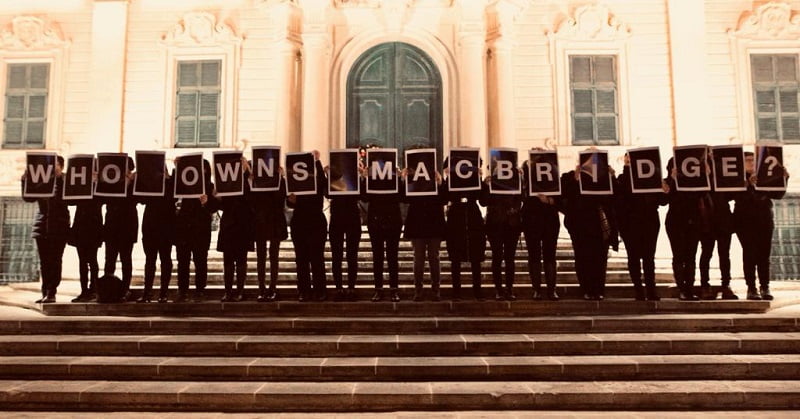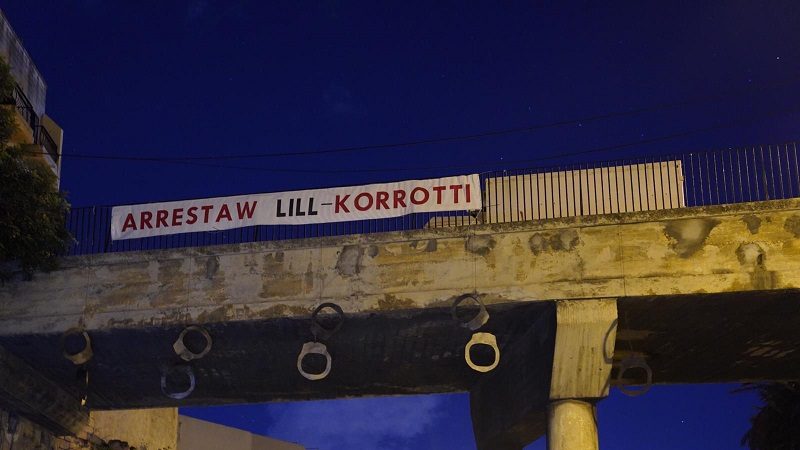As activists gathered outside Castille last week demanding to know who owned Dubai company MacBridge linked to kickbacks to government members on the power station deal, former Ambassador of Malta to the EU John Vassallo was questioning why Malta had entered into an energy supply agreement “so loaded in favour of the seller”.
Perhaps if Assistant Police Commissioner Ian Abdilla had bothered to answer some questions instead of telling a Times of Malta journalist that he does not answer to the media or to the public, there would be some explanation as to why the police are not asking for the evidence they need to help clarify the situation.
Macbridge is another Dubai company discovered by the FIAU set up for the same purpose as 17 Black – to transfer kickbacks to the Panama companies of Tourism Minister Konrad Mizzi and the Prime Minister’s chief of staff Keith Schembri, documentary evidence had shown.
A probe by the Times of Malta and Reuters revealed the mysterious owner behind the company 17 Black – the chief executive of the Tumas Group, Yorgen Fenech. Tumas Group forms part of the Electrogas consortium, involved in the controversial power station deal.
Vassallo, former head of the European Government Affairs and Legal Services of General Electric who was involved in Malta’s energy sector between 1996 and 2008, said in an article in the Sunday Times of Malta that he chose to break his silence about “the shenanigans surrounding the production and sale of Malta’s energy supply” following recent revelations.
He referred to “undisclosed transactions, redacted contracts, long-term gas supply contracts from undemocratic regimes and secret Panama and Dubai accounts now known to have been opened by government officials and a member of the consortium involved in the transactions, with promises to transfer given amounts well into the future”.
He lists the red flags that should have raised the alarm and yet it all went ahead regardless, leading to a deal loaded in favour of the supplier as opposed to the people.
The consortium, including Azerbaijani gas supplier Socar, got a “fool proof agreement,” which Vassallo describes as an over-priced power station, bank guarantees by the government of Malta itself, reducing all capital risks for the supplier, and guaranteed prices paid for all energy produced over 18 years at prices double or more than the market spot price.
“Such an agreement can only be criminally tainted. It is not a normal standard,” he said, describing it as one designed “to take out of Maltese coffers as much cash as possible over an 18-year period”.

Activists ask who owns Dubai company Macbridge on 16 December, 14 months since journalist Daphne Caruana Galizia, who exposed corruption on the energy deal, was assassinated. Photo: Occupy Justice
That is why the questions put to the head of the police economic crimes unit are important. The public has the right to know why the police have not placed the request for evidence needed to investigate and prosecute, as Reuters journalist Stephen Grey said this week.
“None of your business,” Abdilla told the Times of Malta. But of course it is.
As the head of the police economic crimes unit, Abdilla was given a Financial Intelligence Analysis Unit report in spring identifying Fenech as the owner of 17 Black. Yet the owner was only exposed as the result of press investigations.
Vassallo notes in his article that revelations on 17 Black helped make it clear what the plan was from the start.
“The plan was to suck out of Maltese coffers as much money as possible through commercial contracts, charging the local population 30% or even 100% more than the going spot price for energy over several years and using Malta’s sovereign guarantee to reduce all risks for the consortium”.
So if the ownership of 17 Black is so critical to our understanding of the energy deal, why did Abdilla not act on the information that he had?
Vassallo points out that the head of the selection committee on the power station was the same man who opened the secret Panama accounts for Mizzi and Schembri. Brian Tonna of Nexia BT sat on the Enemalta selection committee handling the new project, along with three other staff members from the same financial services firm.
“[He] should have known it was a crime to sell the power station to China and to mothball a power station that was ready to be transformed to gas… It was just throwing away a valuable asset for no reason,” he said.
Instead of being able to charge the consumer an average based on the going interconnector price and the production costs of the local power stations (15-20 cents per KWH), Vassallo said “we are being charged double that amount”.
While the government continues to promote the idea that the Labour Party’s electoral promise of cheaper electricity bills has been achieved, the reality is that what the Maltese people are paying for their electricity consumption is far higher than other European countries. Vassallo says it is 10 times that of Sweden and 50% higher than Germany.
“Part of these higher Maltese prices can be explained by the size of the local market and the overheads required to manage and run the production and distribution of electricity. Yet, the difference is too large to be explained away. There must be another reason,” he said.
But Abdilla was not prepared to give any. “The only person I am accountable to is my boss, the Police Commissioner,” he said. He is wrong.
So, yes, Mr Abdilla. It’s very much our business to know if we’ve been had by our government. And it’s very much your business to ensure that justice is done. Otherwise, those thinking that your quick escalation in the police ranks was meant to serve a purpose may get the wrong idea.













